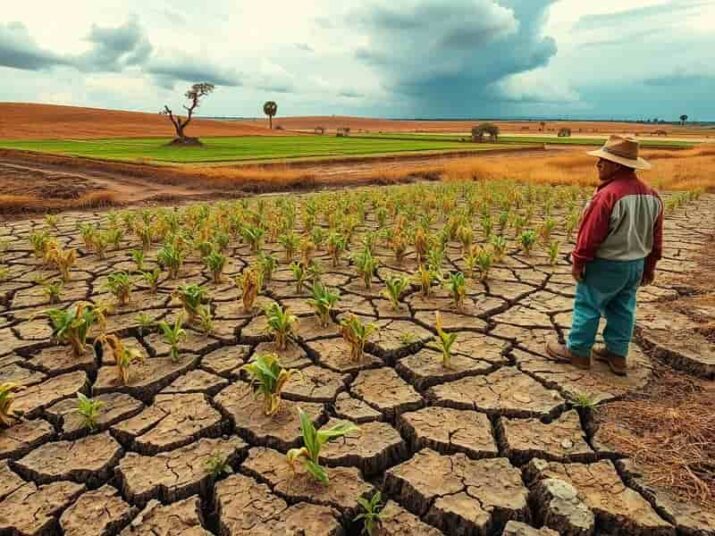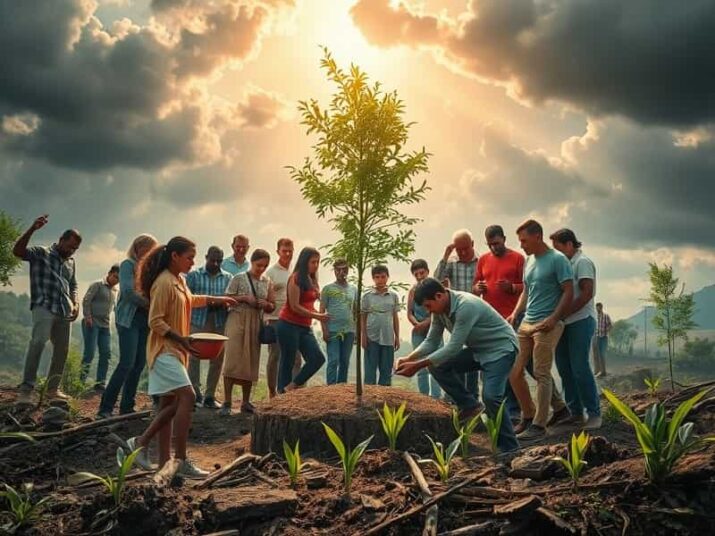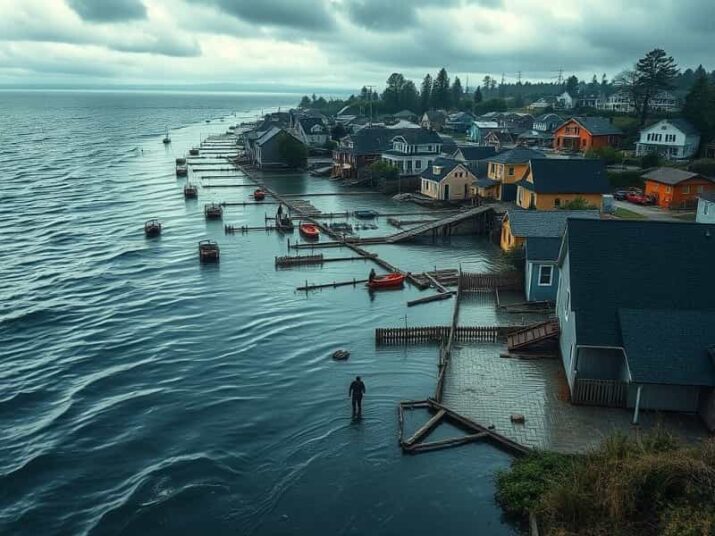Impact of Climate Change on Societies: Modern Challenges
The Impact of Climate Change on Societies: Challenges of the Modern Era
Climate change has emerged as one of the most pressing issues of our time, affecting not only the environment but also the social, economic, and political fabrics of societies worldwide. In an era where many leaders are tainted by injustice, corruption, and a lack of ethics, the consequences of climate change become even more pronounced. This article explores the multifaceted impacts of climate change on societies, highlighting the urgent need for action and ethical governance.

Understanding Climate Change
What is Climate Change?
Climate change refers to long-term alterations in temperature, precipitation, wind patterns, and other elements of the Earth’s climate system. While natural processes can cause climate variability, human activities, particularly the burning of fossil fuels and deforestation, have accelerated these changes significantly.
The Science Behind Climate Change
The greenhouse effect, which occurs when greenhouse gases like carbon dioxide (CO2) and methane (CH4) trap heat in the atmosphere, is a fundamental concept in understanding climate change. Human activities have increased the concentration of these gases, leading to global warming and its associated effects.
Historical Context
Understanding the historical context of climate change is essential. The Industrial Revolution marked a significant turning point, where fossil fuel consumption began to rise exponentially. This shift laid the foundation for the environmental challenges we face today.
The Societal Impacts of Climate Change
Economic Challenges
Disruption of Agriculture
One of the most immediate impacts of climate change is on agriculture. Changes in temperature and precipitation patterns can lead to decreased crop yields, threatening food security. Regions that rely heavily on agriculture for their economy are particularly vulnerable. For instance, droughts in sub-Saharan Africa have led to substantial crop failures, exacerbating hunger and malnutrition.
Increased Poverty and Inequality
As resources become scarcer due to climate impacts, the poorest communities often suffer the most. Climate change exacerbates existing inequalities, pushing vulnerable populations further into poverty. Those who have the least capacity to adapt to changing conditions face the greatest risks. Studies show that agricultural losses due to climate change disproportionately affect low-income farmers.
Economic Displacement
The economic impacts of climate change can lead to significant displacement of workers. As industries like agriculture and fishing struggle, workers may find themselves without jobs, leading to increased urban migration and pressure on city infrastructures.
Health Risks
Rising Temperatures and Heatwaves
Increasing global temperatures lead to more frequent heatwaves, which can cause heat-related illnesses and deaths, particularly among the elderly and those with pre-existing health conditions. Heat stress can also reduce productivity in labor-intensive sectors.
Spread of Diseases
Changes in climate contribute to the spread of infectious diseases. Warmer temperatures can expand the habitats of disease-carrying vectors such as mosquitoes, increasing the incidence of diseases like malaria and dengue fever. Additionally, changes in rainfall patterns can affect water quality, leading to waterborne diseases.
Mental Health Impacts
The psychological effects of climate change are increasingly recognized. Anxiety about the future, grief over the loss of homes or livelihoods, and trauma from extreme weather events can have profound impacts on mental health. Communities affected by disasters may experience higher rates of depression and anxiety disorders.
Social Disruption
Migration and Displacement
Climate change is a significant driver of migration. As specific regions become uninhabitable due to extreme weather events or rising sea levels, populations are forced to relocate, leading to “climate refugees.” This movement can create social tensions and conflicts in host communities. For example, rising sea levels threaten coastal communities in Bangladesh, forcing thousands to migrate to urban areas.
Loss of Cultural Heritage
Many communities, particularly indigenous groups, are losing their cultural heritage as a result of climate-induced changes. Traditional ways of life, languages, and customs are at risk as environments transform or disappear. Coastal erosion and changing ecosystems can undermine the cultural identities of these communities.
Political Challenges
Governance and Policy Response
Inadequate Political Leadership
Many governments, led by leaders who prioritize short-term gains over long-term sustainability, fail to address the root causes of climate change. Corruption and lack of accountability hinder effective policy-making. Political inertia can prevent the implementation of necessary measures to combat climate change, such as transitioning to renewable energy sources.
Global Cooperation
Climate change is a global issue that requires international cooperation. However, geopolitical tensions and differing national interests often impede collective action, leading to ineffective responses to an urgent crisis. The failure of the Copenhagen Summit in 2009 illustrates the challenges of achieving consensus on climate action.

Ethical Considerations
Intergenerational Justice
The current generation has a moral obligation to address climate change, not only for the present but also for future generations. Ethical governance must prioritize sustainable practices and equitable resource distribution. This concept of intergenerational justice emphasizes the need for policies that do not compromise the ability of future generations to meet their own needs.
Environmental Justice
Marginalized communities often bear the brunt of environmental degradation and climate impacts. Addressing these injustices requires policies that promote equity and inclusion in decision-making processes. The environmental justice movements advocate for the rights of affected communities to have a voice in climate action initiatives.
The Path Forward
Recommendations for Action
Strengthen International Agreements
Countries must commit to and strengthen international agreements like the Paris Agreement to limit global warming. Robust accountability mechanisms must be established to ensure compliance.
Invest in Renewable Energy
Transitioning to renewable energy sources can reduce greenhouse gas emissions and create sustainable jobs. Governments should incentivize solar, wind, and other renewable energy projects.
Enhance Resilience
Communities need support to adapt to climate impacts, including investment in infrastructure that can withstand extreme weather. This includes building flood defenses and improving water management systems.
Promote Education and Awareness
Increasing public understanding of climate change and its impacts is crucial for mobilizing action and fostering community resilience. Educational programs should focus on sustainable practices and environmental stewardship.
Encourage Ethical Leadership
Electing leaders who prioritize ethical governance and environmental sustainability can drive meaningful change. Citizens must hold leaders accountable for their climate commitments.
Foster Community Engagement
Engaging local communities in climate action initiatives can lead to more effective solutions. Grassroots movements can mobilize public support and advocate for local needs.
Support Research and Innovation
Investing in research to develop new technologies for mitigating climate impacts and adapting to changes is essential. Innovation in agriculture, energy, and water management can provide solutions to emerging challenges.
The Role of Technology in Combating Climate Change
Innovations in Renewable Energy
Recent advancements in renewable energy technologies, such as solar panels and wind turbines, have made these options more efficient and accessible. The integration of smart grids can optimize energy use and reduce waste, making renewable energy a viable alternative to fossil fuels.
Carbon Capture and Storage (CCS)
Carbon capture and storage technology aims to reduce greenhouse gas emissions by capturing CO2 from industrial processes and storing it underground. While still in the early stages of adoption, CCS has the potential to significantly lower emissions from the most polluting sectors.
Climate Resilient Infrastructure
Investing in climate-resilient infrastructure is vital for adapting to the impacts of climate change. This includes designing buildings and transportation systems that can withstand extreme weather events, as well as developing urban green spaces to manage heat and improve air quality.
The Importance of Community Action
Grassroots Movements
Community-led initiatives have proven to be effective in addressing climate change at the local level. Grassroots movements can drive awareness, promote sustainable practices, and influence policy changes that reflect the needs of the community.
Indigenous Knowledge
Indigenous communities possess valuable knowledge about sustainable land management and biodiversity. Incorporating indigenous practices into broader climate strategies can enhance resilience and promote ecological balance.
Local Adaptation Strategies
Communities can develop localized adaptation strategies that address their unique vulnerabilities to climate change. These strategies should involve stakeholder participation and consider both social and environmental aspects.

Conclusion
The impact of climate change on societies is profound and multifaceted, affecting economic stability, public health, social cohesion, and political integrity. As we navigate the challenges of the modern era, we must act with urgency and purpose. By addressing the root causes of climate change and promoting ethical governance, we can build a more sustainable and equitable future for all.
In conclusion, the fight against climate change is not just an environmental issue; it is a moral imperative that requires collective action, innovative solutions, and a commitment to justice for present and future generations. The interconnections between climate, society, and governance highlight the need for a holistic approach to tackle this global crisis. Only through cooperative efforts and ethical leadership can we hope to secure a livable planet for generations to come.
More Human Subjects
- Identity Crisis: Coping with Loss in a Changing World
- The Last Days: Insights and Spiritual Preparation
- The Real Threat to the Christian Presence in the Middle East
- Return To Me With All Your Heart, With Fasting
- True Happiness Comes Only After Suffering and Pain
- We Are Called to be Shepherds, not Ourselves, but by God







